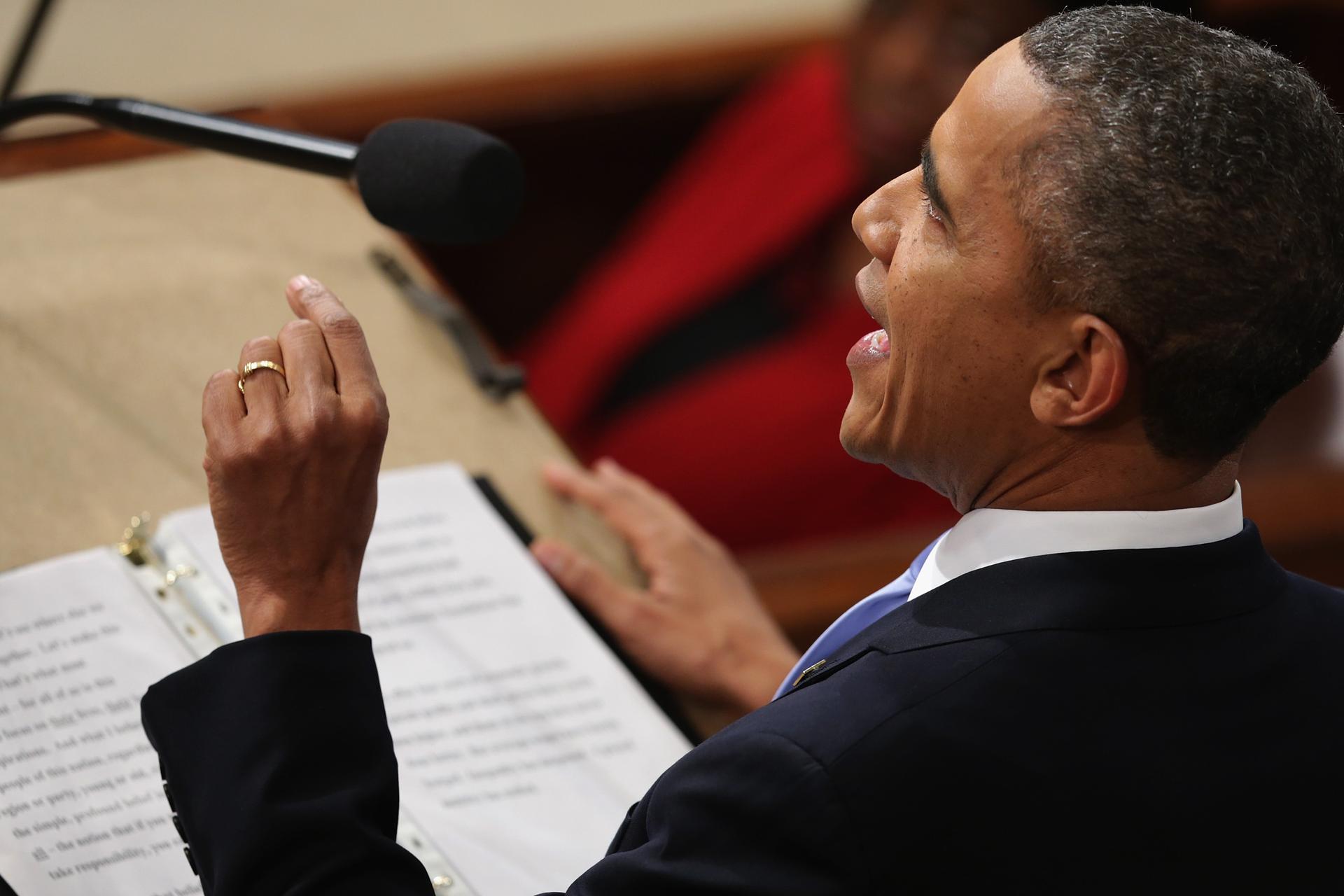State of the Union: Increasingly unequal
President Barack Obama delivers the State of the Union address to a joint session of Congress in the House Chamber at the US Capitol on January 28, 2014 in Washington, DC.
In his fifth State of the Union address Tuesday night, President Obama sought to overcome a growing crisis of faith among Americans who find it difficult to believe the United States is a place that affords "opportunity for all" as he recommitted to implementing "concrete, practical proposals to speed up growth, strengthen the middle class, and build new ladders of opportunity into the middle class."
Obama's speech frequently brimmed with optimism and was peppered with humor-infused pleas for members of Congress, particularly Republican members, to join him in a "year of action" inspired by hope for a more competitive, more egalitarian country.
"Here in America, our success should depend not on accident of birth, but the strength of our work ethic and the scope of our dreams. It's…how the son of a barkeep is Speaker of the House," Obama said early in the speech, referring to Rep. John Boehner, sitting directly behind him, who gave the "thumbs up" and smiled. "How the son of a single mom can be president of the greatest nation on earth. Opportunity is who we are. And the defining project of our generation is to restore that promise."
Download the free e-book from GlobalPost: The Great Divide, Global Income Inequality and Its Cost (PDF) or (Apple iBook)
Income inequality has become a topic de rigueur in recent months as public elites including multinational CEOS, economists, political leaders — plus a barrage of critical comments by Pope Francis — acknowledge that a growing gulf between rich and poor is actually sapping the global economic recovery while driving societal volatility.
The statistics on American inequality show the US turning back the clock to levels unseen since the Great Depression, concentrating an increasingly large percentage of national wealth among the top 1% of earners.
Heading into the twilight of his presidency, the not particularly popular Obama was expected to use the speech to help Democrats running in this year's midterm elections frame an argument designed for voters who haven't seen sufficient economic recovery — though expectations remained low that the address itself would drive action on Capitol Hill.
Though Obama appeared to tailor his speech to the middle class, the Pew Research Center reported Monday that "the proportion of Americans who identify themselves as middle class has dropped sharply in recent years."
The center's survey found that 44 percent of responders identified as "middle class," down from 53 percent in 2008. An even 40 percent called themselves "lower or lower-middle class," up from 25 percent in 2008, while those identifying as "upper class" has slowly declined from 21 percent to 15 percent over the same time period.
Reflecting a rise in youth unemployment numbers in recent years, the Pew survey also noted "young adults ages 18 to 29 were disproportionately more likely to report a decline in social standing."
Other recent polling by NBC News/Wall Street Journal indicates the overwhelming majority of Americans would prefer the Obama administration focus on creating jobs rather than inequality per se, though 67 percent "said they were dissatisfied with the way income and wealth are distributed in the US" and 45 percent wanted the White House and Congress to make reducing inequality "an absolute priority this year."
But how to bring inequality down?
Obama asked Vice President Joe Biden to "lead an across-the-board reform of America’s training programs" and called on Congress to raise the federal minimum wage to just over $10 per hour — "give America a raise" — and reform unemployment insurance.
"But first," he said, "this Congress needs to restore the unemployment insurance you just let expire for 1.6 million people."
Obama also encouraged CEOs to hire more of the country's long-term unemployed and raise wages for those they already employ. He returned to promises made in last year's State of the Union that would offer more American youth early-stage education and better access to technology, including broadband internet and all classrooms.
"Americans understand that some people will earn more than others, and we don’t resent those who, by virtue of their efforts, achieve incredible success," Obama said. "But Americans overwhelmingly agree that no one who works full time should ever have to raise a family in poverty."
But with 22 percent of children living below the poverty line, and 45 percent living in low-income families, according to the National Center for Children in Poverty at Columbia University, the gap between American sentiment and reality would seem as large today as it has been for quite some time.
